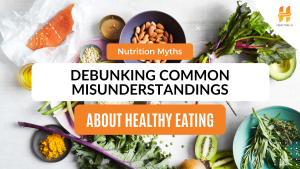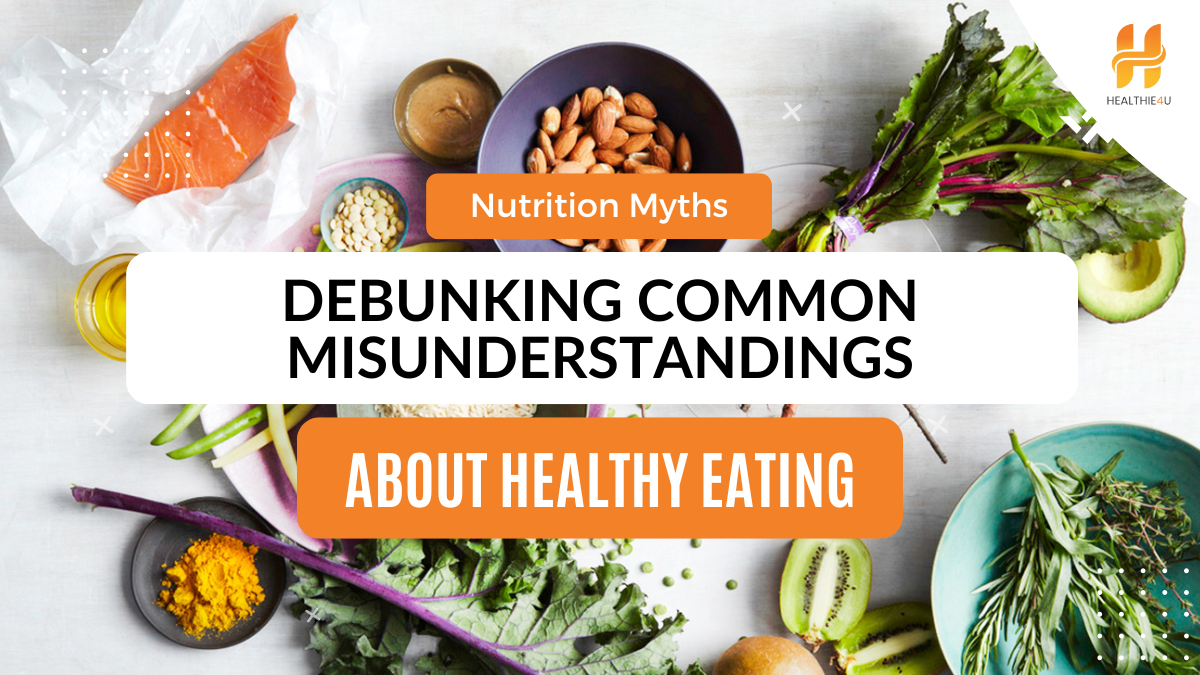
Today, there’s a lot of confusion about healthy eating, mostly because of myths and misunderstandings. Many popular beliefs about diets and nutrition can be misleading and might hold you back from reaching your health goals. This article will clear up some of these common nutrition myths, giving you the right information to help you make better and more effective food choices.
1. Starving yourself is the best way to lose weight-
Starving you is not a healthy or sustainable way to lose weight. While you might see some short-term results, it can lead to serious health issues, including nutrient deficiencies, muscle loss, and a slower metabolism. You will start regaining the weight once you start eating normally again. A more beneficial approach involves a balanced diet with nutritious foods, regular exercise, and healthy lifestyle choices.
2. Weighing scale is the best indicator of weight drop-
The weighing scale isn’t the most effective way to track your progress while trying to lose weight. Factors such as muscle gain, water retention, and changes in body composition can all affect your weight. Using the scale can be helpful as one tool among many, but it’s important to consider additional factors like body measurements, how your clothes fit, and even your energy levels and physical performance. These measures can provide a more comprehensive view of your progress on your weight-loss journey.
3. Weight loss pills, meal replacers are quick and easy solutions-
Many weight loss supplements include ingredients that can negatively impact your health, particularly when taken in large doses or for prolonged periods. Some of these ingredients may lead to issues such as high blood pressure, rapid heart rate, liver damage, or digestive problems. Relying on these products can lead to temporary results rather than sustainable changes in lifestyle and nutrition.
4. Carbs are our enemies, they make us fat. Let’s go “no carb diet”-
Carbohydrates are the main source of energy for your body. Consequently, eliminating them entirely from your diet can result in decreased energy and feelings of fatigue. Numerous carbohydrate-rich foods, including fruits, vegetables, whole grains, and legumes, are loaded with vital vitamins and minerals. Rather than completely avoiding carbs, it’s more beneficial to focus on the quality of the carbohydrates you consume. Choose whole, unprocessed options such as whole grains, fruits, and vegetables, which not only supply energy but also offer fibre and a wide range of nutrients essential for a balanced diet.
5. Skipping meals will result in Weight loss-
Skipping meals can slow your metabolism, which might lead to weight gain or make weight loss more challenging. When you don’t eat regularly, your body may enter a conservation mode, slowing down energy expenditure to preserve resources. This can interfere with your weight loss goals and may increase hunger later, causing you to overeat.
6. Dairy products are fattening-
Many people think dairy products are fattening, so they avoid them for better health. However, they are excellent sources of calcium, protein, and essential vitamins like B12 and D, which support bone and muscle health. While some dairy products can be high in fat and calories, there are many low-fat and nonfat options that are healthy. Instead of cutting out dairy completely, it’s better to watch your portion sizes and choose healthier options.
7. If a food is fat-free, it must be healthy-
Many low-fat or no-fat foods contain added sugars, starches, or salt to compensate for the reduced fat content. These “light” options can sometimes have the same amount of calories, or even more, than the full-fat versions.
8. Honey, Jaggery or artificial sweeteners are healthier than sugar-
Honey and jaggery are less refined and more natural than white sugar, but they all are the same in terms of calories. Studies suggest that routine consumption of artificial sweeteners is linked to increased BMI and cardiometabolic risk.
9. All fats are bad for health-
You don’t need to avoid all fats to improve your health. Healthy fats are essential for your body, providing essential nutrients and supporting functions like hormone production and nutrient absorption. Instead of cutting out fats completely, focus on incorporating healthy options such as avocados, nuts, seeds, and olive oil into your diet. These fats can help contribute to overall well-being when consumed in moderation as part of a balanced eating plan.
10. You need to leave your favourite foods-
You don’t have to eliminate all your favourite foods while trying to lose weight. Including small portions of high-calorie treats can fit into your weight-loss plan. Just be mindful of your total calorie intake.



